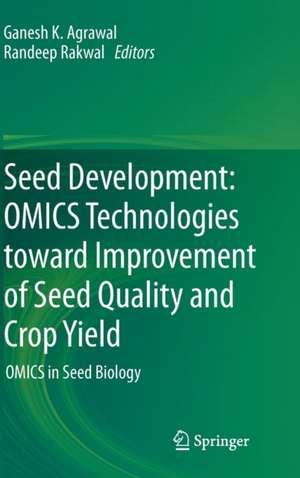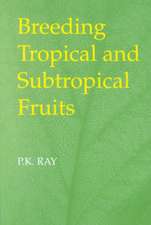Seed Development: OMICS Technologies toward Improvement of Seed Quality and Crop Yield: OMICS in Seed Biology
Editat de Ganesh K. Agrawal, Randeep Rakwalen Limba Engleză Hardback – 7 dec 2012
| Toate formatele și edițiile | Preț | Express |
|---|---|---|
| Paperback (1) | 1231.95 lei 43-57 zile | |
| SPRINGER NETHERLANDS – 29 ian 2015 | 1231.95 lei 43-57 zile | |
| Hardback (1) | 1247.26 lei 43-57 zile | |
| SPRINGER NETHERLANDS – 7 dec 2012 | 1247.26 lei 43-57 zile |
Preț: 1247.26 lei
Preț vechi: 1521.05 lei
-18% Nou
Puncte Express: 1871
Preț estimativ în valută:
238.67€ • 249.81$ • 198.64£
238.67€ • 249.81$ • 198.64£
Carte tipărită la comandă
Livrare economică 31 martie-14 aprilie
Preluare comenzi: 021 569.72.76
Specificații
ISBN-13: 9789400747487
ISBN-10: 9400747489
Pagini: 616
Ilustrații: XL, 576 p.
Dimensiuni: 155 x 235 x 38 mm
Greutate: 1.29 kg
Ediția:2012
Editura: SPRINGER NETHERLANDS
Colecția Springer
Locul publicării:Dordrecht, Netherlands
ISBN-10: 9400747489
Pagini: 616
Ilustrații: XL, 576 p.
Dimensiuni: 155 x 235 x 38 mm
Greutate: 1.29 kg
Ediția:2012
Editura: SPRINGER NETHERLANDS
Colecția Springer
Locul publicării:Dordrecht, Netherlands
Public țintă
ResearchCuprins
PREFACE.- DEDICATION.- PART I: INTRODUCTION.- 1. Seed development: A comparative overview on biology of morphology, physiology, and biochemistry between monocot and dicot plants.- 2. Proteomics reveals a potential role of the perisperm in starch remobilization during sugarbeet seed germination.- 3. Omics platforms: Importance of 21st century genome-enabled technologies in seed developmental research for improved seed quality and crop yield.- PART II: TRANSCRIPTOMICS.- 4. Rice seed development: A cornerstone for cereal crops.- 5. A transcriptional roadmap for seed development in maize.- 6. Using transcriptomics to reveal gene networks of seed development in Arabidopsis.- 7. The Medicago truncatula gene expression atlas (MtGEA): A tool for legume seed biology and biotechnology.- 8. Transcriptomics of legume seed: Soybean a model grain legume.- 9. Peanut seed development: Molecular mechanisms of storage reserve mobilization and effect of water deficit stress on seed metabolism.- 10. Probing the genes expressed in developing seed of oilseed plants: Brassica napus (L.) as a case example.- 11. Networks of seed storage protein regulation networks in cereals and legumes at the dawn of the omics era.- PART III: PROTEOMICS.- 12. Organelle proteomics of developing seeds: Comparison with other plant tissue organelles.- 13. Proteomics in identifying new regulatory mechanisms involved in seed development and ultimately seed quality.- 14. Digging deeper into the seed proteome: Pre-fractionation of total proteins.- 15. The central role of phosphoenolpyruvate metabolism in developing oilseeds.- PART IV: METABOLOMICS.- 16. Search for low-molecular-weight biomarkers in plant tissues and seeds using metabolomics: tools, strategies, and applications.- PART V: TOWARDS SYSTEMS BIOLOGY: ORGANIZATION, INTEGRATION AND MODELIZATION OF DATA.- 17. Plant metabolic pathways: Database and pipeline for stoichiometric analysis.- 18. Coupled transcript-metabolite profiling: Towards systems biology approaches to unravel regulation of seed secondary metabolism.- 19. Using systems approaches to analyze metabolic networks involved in storage reserves synthesis in developing seeds.- 20. Metabolic specialization of maternal and filial tissues.- PART VI: DISCOVERY-DRIVEN SEED AND YIELD IMPROVEMENT.- 21. Marker-aided breeding revolutionizes 21st century crop improvement.- 22. Metabolomics-assisted crop breeding towards improvement in seed quality and yield.- 23. A role for "omics" technologies in exploration of the seed nutritional quality.- 24. Using genome-enabled technologies to address allergens in seeds of crop plants: Legumes as a case study.- 25. Improving quality and content of oils in seeds: Strategies, approaches, and application towards engineering new oilseed crop plants.- 26. Integrating “omics” in food quality and safety assessment.- PART VII: APPENDIX.- References.- Abbreviations.- Editors’ acknowledgment to contributors.- Editors’ biographies.- Index.
Notă biografică
Textul de pe ultima copertă
This book is a unique book, providing a rich source of information on seed development. Seed development is a key step of the plant life cycle that determines the nutrient value of seeds. The nutrient value of seeds is mainly due to storage reserve products such as carbohydrates, lipids (triacylglycerols), and proteins. Omics-oriented approaches have unraveled the mystery of seed biology at an unexpected pace - faster than ever imagined. Containing many important features including physiological and morphological variations in seed species, application of high-throughput technologies in generating datasets and their analysis to drive physiology and biology, integration of such technologies with breeding and other classical approaches in improving seed quality and crop yield and food quality and safety assessment, and a huge reference compilation. These features make this book highly valuable for readers including students. Each chapter of this book has been written and edited by highly experienced scientists. This book is also very useful for all aspects of research in plant biology. The scope of this book is wide including its usefulness in the pharmaceutical industry and medical research given the fact that crop plants are the target for producing proteins / drugs in nutrition (vitamin A) and medicine. In conclusion, the book serves as a reference and textbook in the field of plant seed development, and will further fuel the explosion of interest in this young and dynamic biological discipline. The basic and advanced knowledge translated more appropriately in this book will help in developing integrated strategies to eventually improve the nutritional value of plant seed and crop yield, a critical goal in food security issues around the globe.
Caracteristici
The only book on plant seed development with application of the 21st century technologies Provides a rich source of information including all references compiled in one place Excellent reference and textbook for students, new researchers, and established scientists Includes supplementary material: sn.pub/extras Includes supplementary material: sn.pub/extras







